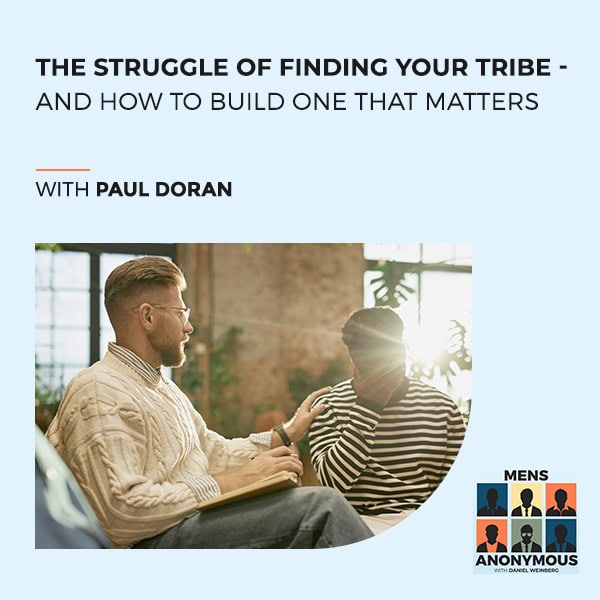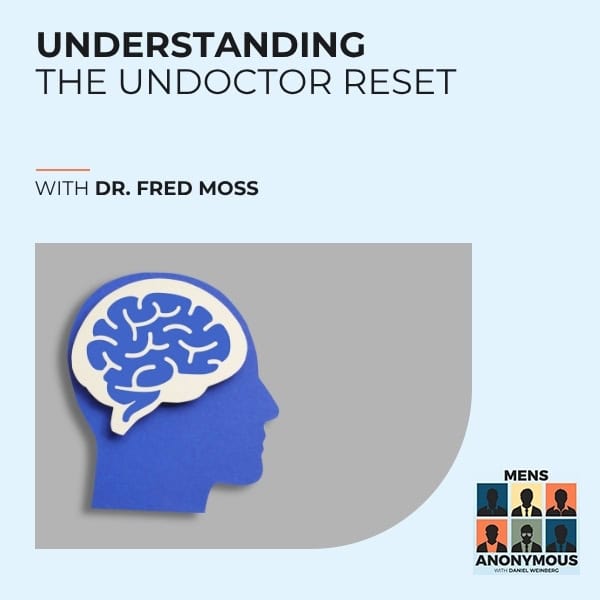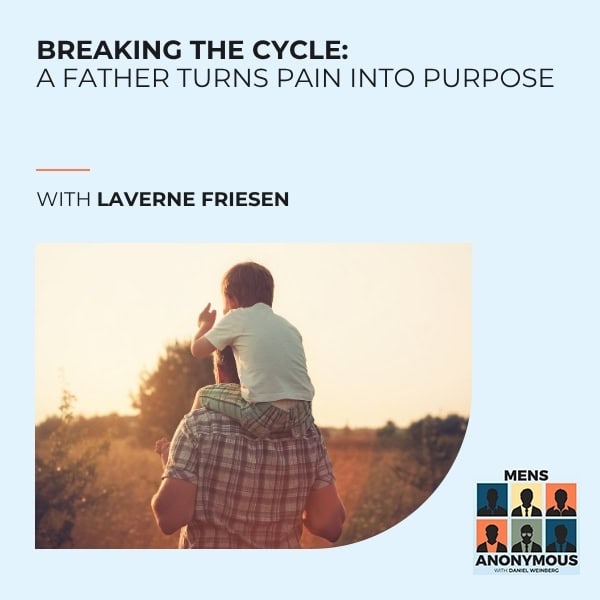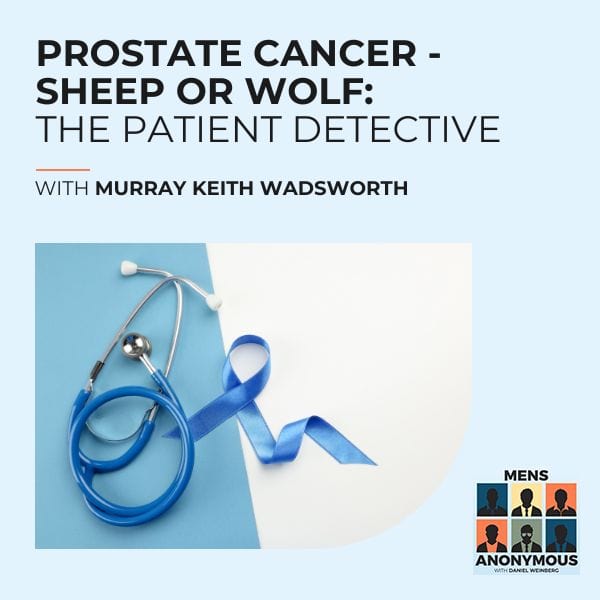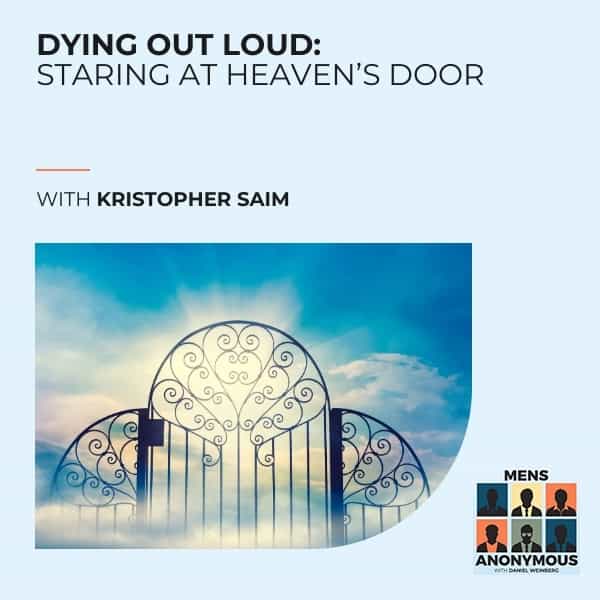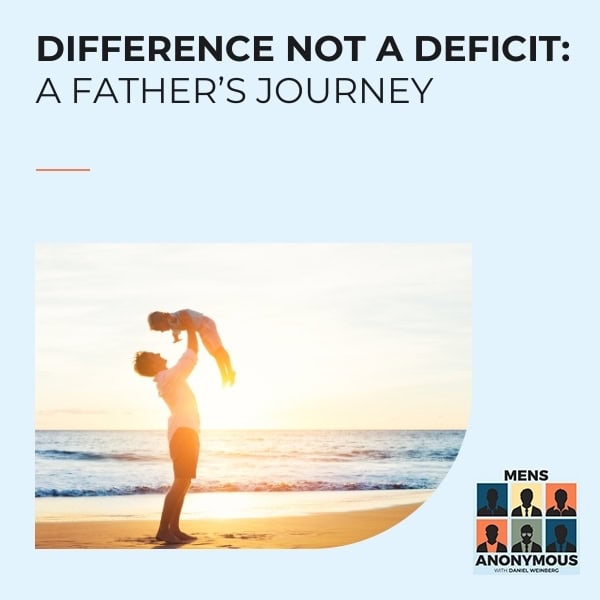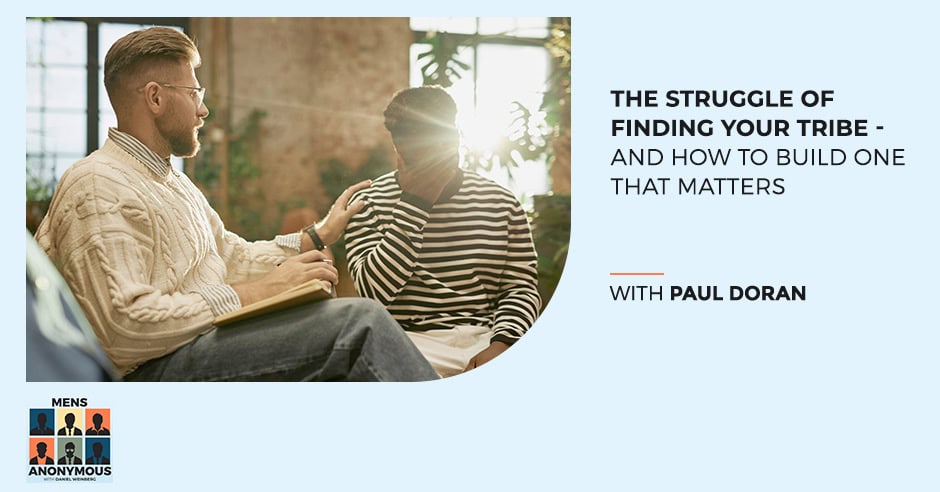
When Paul Doran struggled with burnout, his mental health suffered the most. He did not have concrete goals and was constantly frustrated. But after discovering the power of breathwork sessions and shamanic healing, he was able to gain clarity and find his true purpose. In this episode, he joins Daniel Weinberg to share how his journey inspired him to create The Tryb, a platform supporting men’s mental health care. Paul shares how he aims to address the lack of support system and role models for men, guiding them towards genuine empowerment and fulfillment. He also discusses why every men must learn the importance of self-care, patience, and gratitude.
—
Watch the podcast here
Listen to the podcast here
The Tryb with Paul Doran
Paul, thanks for thanks for coming on. I appreciate it.
My pleasure.
Where are you right now?
I’m in a very gray UK. I’m based in Brighton, a small city on the South Coast, about an hour South of London.
Did you grow up there or you’ve moved there?
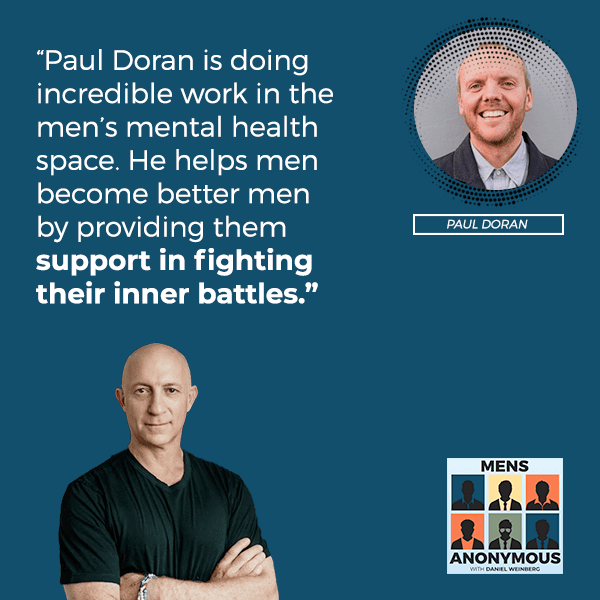
No, I moved here with my family years ago. Great city. I highly recommend it. It’s a mini-London by the sea.
Introducing Paul Doran
You’ve had a interesting journey that’s taken various turns in the road. Obviously, you grew up in the UK, but why don’t you tell us more about your college, going into the direction you took in your life and will come to where you are now?
I grew up in the Northeast of the UK and left when I was quite young, but that’s significant because it’s where my roots are and family roots are. Actually, I was moved away from the Northeast at a very young age, at three. That’s quite unique in my family. My broader family is all still there. I think that that’s a good thing. It’s a beautiful thing. They’re very tightly connected, but I think it says a lot about my upbringing. It says a lot about my parenting and it says a lot about their aspirations. I grew up more in the South of the UK.
I studied Computer Science pretty badly. I enjoyed university. I was very good at my first year. I was so good, I did it twice. I floundered at university. I was on the wrong course. It wasn’t the right teaching for me and decided to leave actually after three years and just wanted to get into work. I had ambition and I had ideas.
Did you know what you wanted to do already at that stage in life?
I still like technology, so it was a hunch then. I’m going back to 1997 and the internet wasn’t around. The tech wasn’t at all what we know now, but I knew I had a fascination for change in innovation and that’s been a pretty consistent team throughout my life and certainly throughout my career. I jumped off this Systems Analyst degree, which is training me to be a developer. I dived into marketing. I worked in a small regional agency down on the South Coast and just loved it. I was given a long leash, lots of responsibility, free reign to learn lots of skills and I loved it. I enjoyed it. Three years down there. I had itchy feet and lots of my friends wanted to travel, so I took a year out and traveled Southeast Asia.
What age are we talking now?
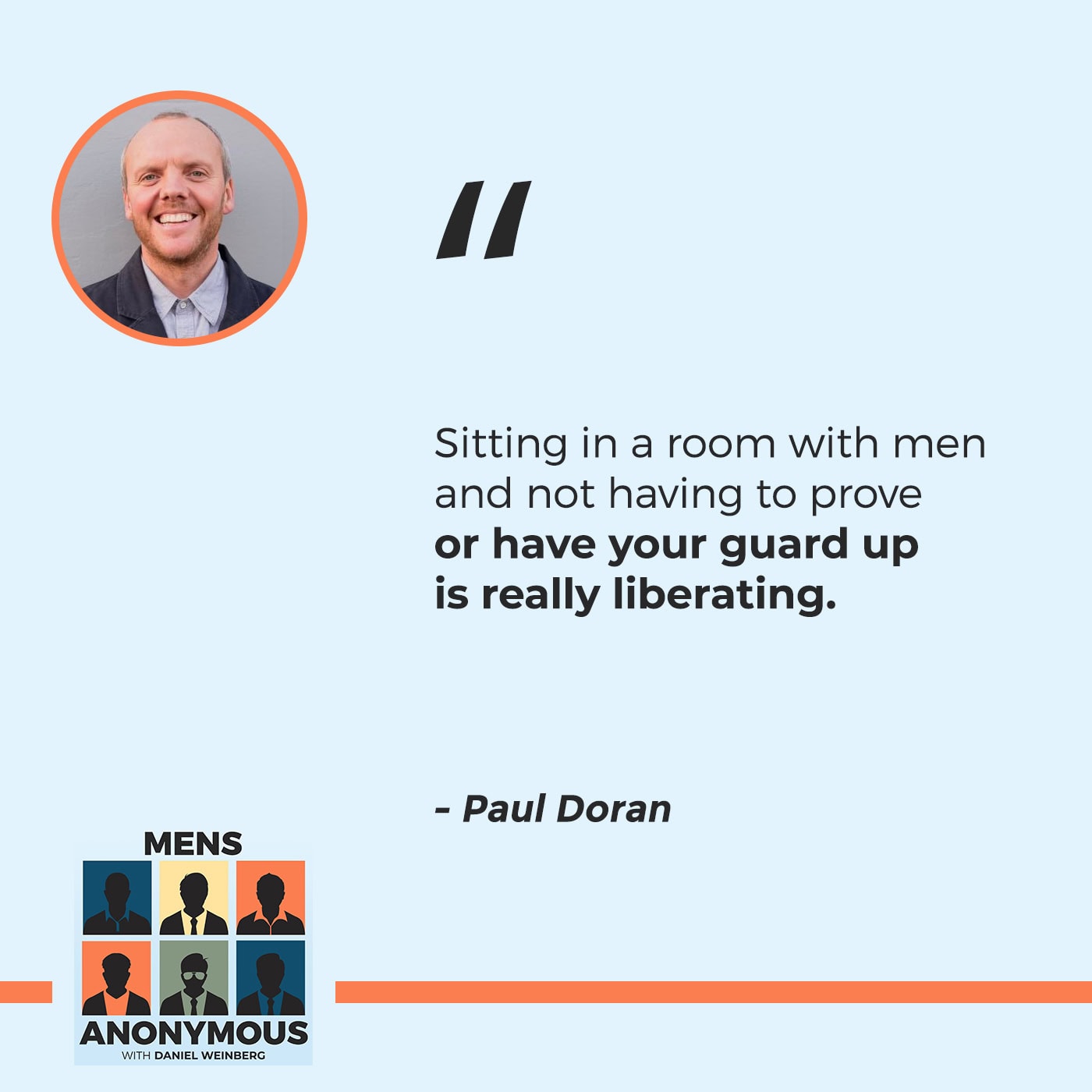
I would’ve been 21, 22. A little bit of cash in my pocket, having worked for three years and spent a year and a half in Southeast Asia, Thailand, Philippines, Indonesia and a period I’ll never, ever forget. I then moved back to London. I didn’t move back to the South Coast. I took up a job in London and continue the marketing route. I joined a big global agency called Ogilvy. It’s pretty well known. It was at the time of the dot-com bubble, 2000, I guess. It was a phenomenal time in tech and I think I caught the bug. At the time, there were very early dot-com entrepreneurs.
That was a time where you could dream. Basically, your imagination was your limitation.
There was a number of slides you had in your deck that was your business. People were getting funding on the back of decks and were ipoing within twelve months. It was a crazy and fantastical time for me being in Ogilvy. Lots of companies were coming to Ogilvy, global brand success. They’ve raised a lot of money. To go to the best agency seemed like the right thing to do at the time, which is why so many tech startups did that. They burnt cash quickly. It was a wonderful period. I met my wife there. There was a lot of good that came out of Ogilvy. I moved on. I moved to another pretty big agency.
Are you married once or still married?
Yeah, still married. I moved agency. Actually, we tried to get a relocation. My wife and I tried to get a relocation to China within Ogilvy, but it was a big ask. We were a dating couple back then. I understand why they didn’t want to relocate us to one of the Chinese offices. I was just fascinated with travel at the time.
I decided to move to another agency and spent about eight years in total in big global agencies, where I became increasingly frustrated with the model. I didn’t like the big agency consulting model, where you’d meet the gray-haired, experienced people on day one and all the work pushed down into a hamster wheel.
When you start pushing on doors that are opening, you will get in the right direction. Share on XIn 2006, I set up my first business. It was a 100% distributed business, a 100% virtual agency. Twenty of us across Europe. We had ten years or so experience in tech marketing and a leap of faith, because back then, the expectation was you had big glass meeting rooms and expensive biscuits. That was the way of the world. No one worked out of a private members club and didn’t have offices. We communicated via Skype for those who may or may not remember Skype. I think it’s still around.
Dropbox was just being launched. We glued this business together as the antidote to the agency model, which for me, was BS. It was being charged out astronomical day rates. Switch ran for eleven years, which was a brilliant and learned part of my life. It was a great part of my life for nine years. The last two years, I’d had enough.
You pioneered at-home working before it became a thing.
In 2006. I could see that there were skillsets out there. I actually saw a lot of moms who I’d worked with who’d gone and had children who were like, “I’m desperate to get back to work.” I knew that there were great communicators, great marketers, but they couldn’t find their way back into the workplace. Switch Communications, my agency, represented a flexible way for people to work and live. It was pretty out there back then.
I’d grown tired of it after 9 years and wound it up after 11 and actually that coincided with my move down to the South coast. When I wasn’t running the agency, the shift out of London to Brighton felt quite seismic at the time. I was thinking it was going to be a daily commute or weekly commute on a train. Actually, the world’s unraveled very differently since then.
What was the original inspiration to move from London, from the big smoke to the little smoke?
I would say family was the motivation. London’s a tough city. Any big city is tough on you as a human, as an individual. My children were turning 8 and 6 and it just felt like a safer place for them to be out of London. There are dangers everywhere but I think there are greater dangers in cities like London. I was desperate to move, actually. It became quite divisive, to be honest. My wife and I were at loggerheads.
She didn’t want to go. You wanted to go.
Yeah, resulting in marriage counseling. My wife, Lizzie, thought the world would come to an end if she left. I think when you sip the Kool-Aid of a big city like London, it’s moorish and quite addictive. Its sheen had worn off for me. I’d had enough. The noise, the pollution, the lack of space, which actually is now manifesting itself in my life. Importantly, it just wasn’t there. I had one happy place in London when I used to ride a motorbike around London. A really happy place. It wasn’t until many years later, I realized what is my happy place.
It’s a bridge called Waterloo Bridge and if you’re going South to North on Waterloo Bridge, the river bends around you. It wasn’t until later I realized it’s the only place in London you get a vista. You get a bit of a horizon and I just felt comfortable and safe in that. I felt trapped, I think. I’m delighted to say we did the work. My wife and I put the work in and Lizzie absolutely loved it down there. It was a good move.
Moving Homes And Married Life
When you say you did the work, you decided to go do couples therapy to talk about, basically, “I want to live here and she wants to live there. This is obviously a problem because we are together and we should be aligned to want to live in the same place, basically.” That’s big. I’m sure that happens with a lot of couples, to be honest. It’s like they want to experience something different. How did you guys work through that? What would you say were the compromises or the or let’s say the negotiation of that process?
Patience. We were polarized over a topic. I think that topic could have been anything in any relationship. We can find ourselves on the opposite side of the bridge and our view and our opinion just locks in.
That has got a big impact on your lives. It could potentially mean one is happy and one is not happy. It is like someone’s sacrificing something there.
There’s got to be some give. I feel like it was a process that that took. It did take two years. It became heated, but never it never felt terminal, which is the reason we’re still together now. There were deeper things to the relationship, but we needed to join back together in the middle of the bridge.
What got it over the line, would you say?
It was a particular house in Brighton. I’m being glib, but we were looking at places and some cities weren’t right for Lizzie or weren’t right for me. In fairness, because of the process, we absolutely ended up in the right city because of the time it took, because of my wife not wanting to rush. We looked at lots of the wrong places where I’d have gone, “Get me out of London.” We ended up down here in Brighton and looked at a house and it was a beautiful house and it became available. Just like all good things in life, when you start pushing on doors that are opening, you know you are going in the right direction. All fortunes opened up. The house became available. We secured it and we moved into it. We got the school that we wanted for the kids. We’ve never, ever looked back.
Do you think she loves it equally as much as you?
Absolutely, more. I hope she doesn’t read this. She knows this, but I’ve already got itchy feet.
Time to move.
I’m planning a five-year horizon now, so I’m just giving it time. We’re in a second or third kind of relationship. Pre-kids, kids and now post-kids era and we’re reinventing ourselves as a couple and you suddenly have the opportunity to go. We can actually decide where we want to be in the next decade, how we want to live, where we want to live, because our children are beautiful and independent and growing up and doing their thing. That’s exciting and also a bit daunting.
It could be could be scary because you’ve had this dynamic of a family unit and then the birds leave the nest and then it’s like just the two of you again. It’s like, “Okay, let’s go.”
“Who are you?” There’s a period of reinvention and reestablishing our roles because it’s such a seismic part of our life. Paternal, maternal roles that we play. Suddenly, you take that away and you, it’s, “Who am I and who are we?” That’s been a beautiful process and is an ongoing process. Looking at places maybe earlier in the year, January, February, March, they’re a bit warmer, a bit brighter and a bit sunnier than the UK would be enough. I love the city. I probably don’t ever want to leave it fully, but would like to spend some time elsewhere.
Undergoing A Career Shift
With regards your career, you had a bit of a fork in the road there. You land your business and then where to next?
I’d always been on the agency side, consulting for numerous brands and businesses, and helping them with strategy. I’m a tech marketer. I help build early-stage tech companies. It is what I do. I worked at Google. I’ve been a lead mentor for Google over the years, helping their startup businesses. I moved down here and actually got talking to a neighbor who was building a business out of New York, a very early-stage business in the ride-share space, providing taxi insurance to rideshare drivers. There was five of us around a kitchen table 100 yards down there. We hacked away at it for twelve months. None of us were earning anything. Suddenly, we got a bite and suddenly, I found myself strapped into a rocket ship of a startup.
You need energy to find and run a startup, but there are shortcuts and ways to avoid pain. That comes through experience. Share on XIt absolutely flew. We were in the right time, in the right place with a good product and had an amazing journey. We built this business, this tech startup, in New York. We launched the business in the UK, and further launched it in the Netherlands, in Amsterdam. We raised tens of millions of dollars. We’re partnered with Uber and some of the biggest insurance companies in the world. It was an incredible rocket ship. A brilliant ride and formative in my learning and understanding of being on the client side. It was also formative in me neglecting myself. I actually burnt out after about four and a half years through lockdown. I would say that compounded the situation.
You lost the work-life balance.
Totally, like it was everything and totally hooked on it. Startup is super addictive when it goes and even when it doesn’t go, it’s addictive because there’s so much feedback you get from a small business like that. When you do something, you have success or failure and that’s addictive. I realized I am addicted to it. It’s my habit. My name is Paul Doran and I’m hooked on startup.
This show is called Men’s Anonymous, so you’re a startup addict, basically.
I am. That brings us up to about 2022, which is known as the second bubble in tech circles. The second bubble burst on tech stocks and on tech investments. The VCs ran back onto the rocks from where many of them came from good businesses, like a new one that I was part of a small team. It just couldn’t raise money. The teams had to shrink back down to founders. That was 2022 and great lessons and again, another business to have an interest in. It continues on, but it’s the peril of working in early-stage technology businesses. They are inherently unstable, high-risk, which makes them fascinating and wonderful, but also high risk.
High risk and a bit of an emotional rollercoaster.
You have to have everything in it because it’s a seven days a week job. If you don’t love it, then you’re not willing to put that time in.
Would you say then it’s more of a young man’s game than someone in their 40s starting up doing startups?
I wouldn’t. Unfortunately, what startups need is experience. I think there’s a lot of bro-dom, masculine, young inexperience in the startup businesses themselves. That’s been mirrored in the investment landscape. There have been a lot of inexperienced people investing in companies from a VC perspective that give poor advice based on no experience. There’s been this collegiate dance, I would say, that that hasn’t been helpful, that hasn’t been healthy.
It’s interesting to see the collapse of the VC space in the past few years. The post-Uber era, a lot of people call it the post-growth at any cost and a return to proper business values, sustainability, profitability, solid products, not just growing real business by venture money. Real businesses. I think that’s a good thing. You need energy to run and found a startup, but also, there are shortcuts and ways that you can avoid pain. I think that comes through experience. You need a combination, I’d say.
Discovering The Power Of Breathing Sessions
2022 burnout, double startups and you decided to shift. You made a shift. What was the event or the light bulb moment or what was that one point in time that you can go back to and say, “That’s when I decide to turn right instead of keep going left?”
Ironically, I’m working in my back bedroom and it was an online breathwork session I did that was quite incredible. It was profoundly life changing in terms of my physiology, how I felt.
Why don’t you explain what a breathwork session is for those who’ve never done breathwork sessions?
It was new to me. I thought it was a bit weird. I thought it was a bit mumbo jumbo, a bit woo-woo and not for me.
How’d you even find out about online breathwork sessions?
I’d been studying the nervous system through burnout. I studied polyvagal theory, which is a nervous system in the body that helps regulate or deregulate breath. It became clear to me that the breath is an accelerator pedal, but the breath is also a brake pedal. That resonated and clicked through this self-education I was doing. I discovered a fascinating guy called Johnny Miller, who was doing online breathwork sessions.
Were you particularly stressed out at the time that you were looking for like, “I’m not really coping well here, so I need to find some tool or an outlet to de-stress or get myself recentered or rebalanced?” Where did your curiosity get piqued?
I describe myself as a curious human. I was looking everywhere. I felt a sense of disease post this burnout, or at the end of this burnout. I wanted answers. I wanted to understand what had gone on in my body, why I felt the way I did in my chest.
What were you feeling? How would you describe how you were feeling?
I was lost. I was unanchored. I wasn’t making clear decisions. I wasn’t making good decisions. I was probably self-medicating quite a lot to take my mind off things. I wasn’t present, probably in relationships and with family. I remember my family saying they’d lost me for four years.
Was it your wife or your parents or your kids?
All of them. I was just consumed by building businesses and not being present and not feeling like someone that they knew formally. I knew that there was something wrong and breathwork appealed. It was logical and I’m quite logical. I like, “I can understand how that regulates chemistry in the brain,” which pacifies nervous systems. I did this breathwork session and it blew my mind. It was 50 minutes, what they call a consciously connected breathwork session where you literally breathe out and in through your mouth as hard as you can for an hour.
It sounds simple, but you change your brain physiology. You change your body’s chemistry into an alkaline state. You shut down prefrontal cortexes of your brain through that chemical change, which changes your thinking patterns. Ultimately, you end in this incredibly psychedelic, deeply restful state, which I hadn’t felt for a long time. That was the start of a beautiful relationship with breathwork. I practice it every day now. Not quite so explosively every day. I don’t need to visit Mars every morning.
What’s your ritual?
I vary it and I change it up. There were so many different types of breathwork you could do. Pranayama yoga type breathing through to just controlling and regulating the depth of your inhale compared to your exhale. This is about changing the chemical physiology in your body. There are many different ways. I change it up to keep it interesting. I meditated for a long time, but I got quite bored of that. It was just too same-y. Breathwork for me is a great distraction from the mind because you are actually focused on doing something. It worked much better for me than meditation.
What would you say the positive effects were for you? How would you summarize the benefits? Obviously, were like, “This is feeling good for me.” What did that mean for you? Were you sleeping better at night? Were you more clear during the day making decisions? Were you more present? What would you say the benefits were?
I think it was a beautiful sense of my ability to control my own body and to self-regulate feelings and emotions and to I think what they call these days introspect to look in and to go in and connect with yourself. Rather than thinking, “Everything’s happening to me, it’s all external and I just have to cope,” it’s like, “No, I can deflect this. I can just not even think about that because it’s not important.”
It was this idea that I can take control of my mind and my body for good use. I wasn’t just some victim of external circumstances. I could introspect. I could change how I was feeling simply by stopping, slowing down, and adjusting my breath. With that, I think you’re basically engendering a sense of calmness. Obviously, with that, you think clearer. You sleep better. You want to exercise in the right way. You want to look after yourself in the right way. It’s just beautiful.
Breath is both an accelerator and a brake pedal. Share on XI’m sure those around you are also more drawn to you because it’s like, “He’s so calm and so centered.” Your kids, your wife, if you’re talking about such a big ship, they would’ve noticed something.
Without question. The shortness, the quick to explode, that temperament was lowered. I physically remember literally taking heat out of my body. Indian cultures talk a lot about doshas and heat spots and energies in the body. I could physically feel eventually just that heat and almost rage or anger, or tension, or stress, whatever you want to call it, I can control that. I can regulate that. That was a beautiful sense of realization.
Just so we understand the chronology, at what age?
I’d say mid-40s a pivotal time. Clearly, my transition felt like it was starting there as a man, my role, my responsibility, who I thought I was, why I was on the planet, what I was here to do. Had I achieved or had I not achieved what I wanted to do? I think it feels like that was the period for me when everything just started to piece together in a good way.
Becoming A Shamanic Healer
You had this experience and then where have you taken it from your 45 to now? It sounds to me like you reallocated your energies and your brain real estate to focusing on, “This feels good. I want more of this.” Where have you taken it?
I think it’s a nice way to frame it and to look at it. It’s a reallocation of heart, mind and body. I have definitely made that shift. I’ve probably pushed things a little further than most in the last few years. I went way out that way. I trained as a shamanic healer. I journeyed through the UK through a tribe linked to a tribe in Brazil. I trained in the UK with various shamanic healing techniques. Shamanism is simply the forgotten art of using nature for healing and wellness.
Very ancient methods and learnings and wisdom of nature.
We’ve forgotten about it. We’ve moved away from it because actually sitting under a tree doesn’t earn big pharma any money. Swimming in cold water doesn’t earn big pharma or doctors any money. Tablets or drug sells. This idea of shamanic healing is quite beautiful. I journeyed with some plant medicines. I’ve understood a lot of the techniques that shamanism brings back to life. That’s been wonderful. I don’t practice. It’s simply been about education. I guess that’s a curious human in me. It’s like, “Where can this go? How can I use this?”
Listening To The Body
In terms of how you stay balanced or how you achieve who you are now, what would you say is your what’s your daily ritual? What’s involved in your daily ritual? I think it would be very helpful. I found that it’s very much tailor-made for everyone. Different things are going to work. You were talking about how meditation got to be boring for you. You can get the same effects out of meditation as you can breathwork, for example, and multiple other activities.
I’m not suggesting your technique is the technique that all should apply, but it’s more about testing, experimenting, trial and error and seeing what responds well to you in terms of is it yoga, exercise, or reading. Naval gets up and he decides he’s going to do nothing for an hour and just see what happens just disconnect. It’s a form of meditation, but it’s not like a traditional meditation. What are your rituals that work for you?
My rituals are not to listen to any of those people. I will not be one of those people that say you need to do 30 things before you get out of bed, because it’s BS. People need to listen to their bodies. We’ve lost touch with our bodies.
Also, with ourselves in a holistic way, the body, the mind. Your emotion.
The body reminds you, nudges you and tells you and gives you warning signs. I think we all owe it to ourselves just to listen in more, lean in more and do less. Not do more. Don’t do more. Don’t do the three things that are going to make you rich this week. They aren’t the answer. We all know the answers for ourselves. Just sitting and listening and giving ourselves more time, giving ourselves a day or an afternoon or even an hour of saying, “That hour is for me. Whatever I do with it, that’s for me because I matter.”
If I just happen to sit in and listen to myself, or I go and do something I love doing, I think that’s been the best thing for me, to listen to my body and work out what’s right for it. What’s right for me is not right for you, Danie, etc. I think turning off the digital noise is definitely part of it. That’s helped. Listen to your own mind and your own body.
Starting Tryb
Tell us your rituals, though. Give us some of the rituals that work for you, the breathwork.
I live near the sea, so I would say every day, I start with some form of breathwork, probably closely followed with a gratitude ritual. Just to engender gratitude in the body. It’s a very high and powerful frequency. When you feel gratitude, not just say things, you have to feel.
Is it something you think, is it something you journal or you say out loud? How does that play out?
A bit of both. A bit of all of the above. It’s a saying that resonates with me. It’s about feeling the effect. Feeling gratitude is a very high-level frequency for the body. It’s very calming, it’s very good. A bit of breathwork, a bit of gratitude and then walking. Walking for me has been the answer. I have a dog, which is very helpful. I probably walk an hour a day minimum, most of the time in the hills near. We’re sandwiched between the sea here in Brighton and some hills. Not mountains, just hills. It’s a beautiful place to walk. I used to take audiobooks and be cramming in learning, but I’ve stopped. I’ve realized actually this is time off.
Just silence. Whatever happens, happens.
Completely. I am pretty rigorous with never allowing meetings or calls before 11:00 AM. That’s my time. I function best between 5:00 AM and lunchtime. I operate best. I now know that, so I keep as much of the morning clear. The thinking, planning, writing, doing rather than just being on calls or doing meetings. Just in general, I’ve got into yogic stretching and just mobility stuff to make sure that I’m keeping vital bits of me moving. There’s the Five Tibetan Rites. It’s all over youtube, a simple thing to search for some lovely movements that are supposed to promote longevity.
It’s like a series of yogic movements that you can do in fifteen minutes. Fundamentally, they move the spine quite significantly backwards, forwards, left and right. It’s really powerful. I guess a moderation of absolutely everything else. Wine, beer, food, indulgences, just a bit of moderation. Stop beating myself up. I could be bad at going, “You can’t have that now. You can’t have that.” I’ve just let go of that. It’s not like I was an addict or something. I would be self-critical. It’s like, ‘If you want to have a glass of wine, Paul, on a Tuesday night, have a glass of wine. It doesn’t matter.” I’m just being a bit kinder to myself.
You took that and you partnered with a mate of yours. You’ve started another startup, which is a platform for men, correct? The Tryb. Why don’t you talk us through how that came about?
Sure. I guess Tryb is a product of my own journey, my curious want to find answers to why my body was feeling a certain way, what burnout was. I wanted to find solutions to that. Actually, it was hard. It was a lot about word of mouth. Someone knows someone that goes to this men’s walking group or this men’s sharing circle, or there’s a meetup just for men in a coffee shop on a Friday morning.
Tryb is hopefully an answer to that, that there is some good work happening out there. There are great groups, but they’re quite hidden. Also, it appears very hard to persuade men to get involved to perhaps admit that actually something isn’t right, that something isn’t feeling right. Partners, lovers, friends, family can say whatever they want. It’s not until that individual says, ‘I’m ready to go and seek help.” That could be anything from therapy to community groups that are there to support men.
It’s like going into a space where they can open up, let go and peel back the layers, for want of a better expression.
Breathwork is a great distraction from the mind because you are focused on doing something. Share on XThat’s a classic men’s group, a sharing circle are increasing in popularity. We’ve got a problem, Daniel, in society, not just with men or young adolescent men. I think there’s a growing sense of disease amongst people that life isn’t fulfilling them in the way that we’ve been promised. There are so many systems around us that are not serving us well, whether that’s capitalism, economics, politics, healthcare systems, the food industry. We’ve reached a point where we’re going, “It’s not good enough.” We’re being made sick, we’re being kept sick, we’re being kept poor, or being made incredibly wealthy and there’s a disease and a discomfort in the systems. Men, not exclusively, seem to shoulder quite a bit of that burden as the traditional provider, as the breadwinner.
The prescribed role of what the man is supposed to do, the role the man’s supposed to play in society.
That role’s changed, rightly so. There’s a balancing up and the rise of feminism has been a brilliant thing, the balancing up. I think men have lacked new role models. There are some startling statistics in the UK that male suicide is actually the biggest killer of men under 50. It’s even worse than that because three-quarters of those that take that action are not under any kind of supervision. They’re not currently talking to a doctor. They’re not on medication.
They’re the surprise events.
Yeah, it comes out of the blue. It’s almost like a last-ditch attempt of despair.
You say they’re suppressing a lot, but what’s driving that, would you say? What to tends to be the reasons why someone decides to take their life at 45 as a man? What do they say the reasons are behind this?
Financial pressures quite often are high up there and relationship issues, but are spiraling out control that ultimately isn’t shared with others. Physiologically, you and I are probably quite unique talking in this way that we don’t emote, we don’t open up as a species, as a male. If we think back to our ecology, where we came from, we were out providing. We were out hunting. Emotions are secondary and not required when you are out trying to survive. We haven’t evolved in lots of ways. We do need to. If you think about wives or girlfriends or partners, there’s a very natural support infrastructure, a network where conversations take place naturally about deeply personal things that you and I or perhaps men don’t traditionally talk about.
That support structure and support network just isn’t there for men. If you search mental health services or if you search for support services, there is a huge amount for women, but not for men. This idea that you have to know someone to find a good service provider, for us, that Tryb is a bad thing because that’s just propagating the problem of men not being able to find a solution to perhaps despair or depression or not feeling connected to people.
It isn’t always about solving suicide. Suicide is obviously a horrific outcome but there’s a much longer journey. Tryb is a marketplace of services where any man can go on and search for a provider that might just help inflect the direction of their life by one degree. That’s all that we ask. We’re piloting it in Brighton at the moment, but we’ll be rolling it out much wider in the next couple of years.
Do you have your own tribe, a group of friends or men that you meet with on a regular basis or open up to, would you say?
I do now. I didn’t.
When did that come about?
I think over the last few years. I think the realization of just how powerful they are to sit in a circle or a room with men and not feel like they have to prove or that you have to have any guard up, it’s liberating. We live in a bit of a bubble here. Brighton is a very open city and there’s a lot of it that goes on. I think it’s patchy across the rest of the country or the globe. I think men are willing to open up and emote. I know there’s a culture in the US of therapy. It’s very common. In the UK, we’re a very close species and culturally not open to being emotive, to being emotional.
If you think back to parents, my parents and certainly my parents’ parents were probably involved in war at some point and emotions are not required in war. We had this industrial shift where work was the proving ground. That softer side, I’m hesitant to use that word, that emotional side of the male has been lost and there’s not been good role models. There’s been a bit of a vacuum.
It was actually frowned upon to even show such weakness by being emotive or not being able to cope with whatever was happening in their lives. It’s actually seen as unmasculine, in a way.
That is crazy and we’ve obviously seen the rise of the toxic side of the internet. These role models, the Andrew Tates of this world, have appeared in the vacuum. They’ve appeared simply because there’s a vacuum. Rightfully, that’s been shut down. Rightfully, they’ve been found out as to exactly who they are. Tryb is currently focused at more men are over 40. For me, I think there’s equally a huge job to be done with young adolescent men.
Advice For Young Men
If I were to ask you, if you had the opportunity to either give advice or transfer over some wisdom or tools to eighteen-year-old Paul, what would that be? What would you tell your eighteen-year-old self about the travel on the on the, on the journey that you did that with a better mindset or in a more optimal fashion?
It’s pretty easy for me, actually because I have been impatient a lot of my life and strived to prove, but striving to prove myself to myself.
Instead of being validated by others?
We have lost touch with our bodies that are telling us so much. Share on XA bit of both. I think they’re hand in hand and I’ve been impatient and there’s nothing more valuable than being patient and giving yourself time and saying that what you’re doing is enough and whatever ambitions you have, large or small, if you’re committed to them, they will happen. You just have to be patient. I was quite impatient. Patience is what I’d probably tell my eighteen-year-old self.
Quick-Fire Questions
I’m going to finish off with a few quick-fire questions, which I like to ask my guests. You can answer as short or as long as you wish. We’ll go one by one. Who would you like to say sorry to, given the chance?
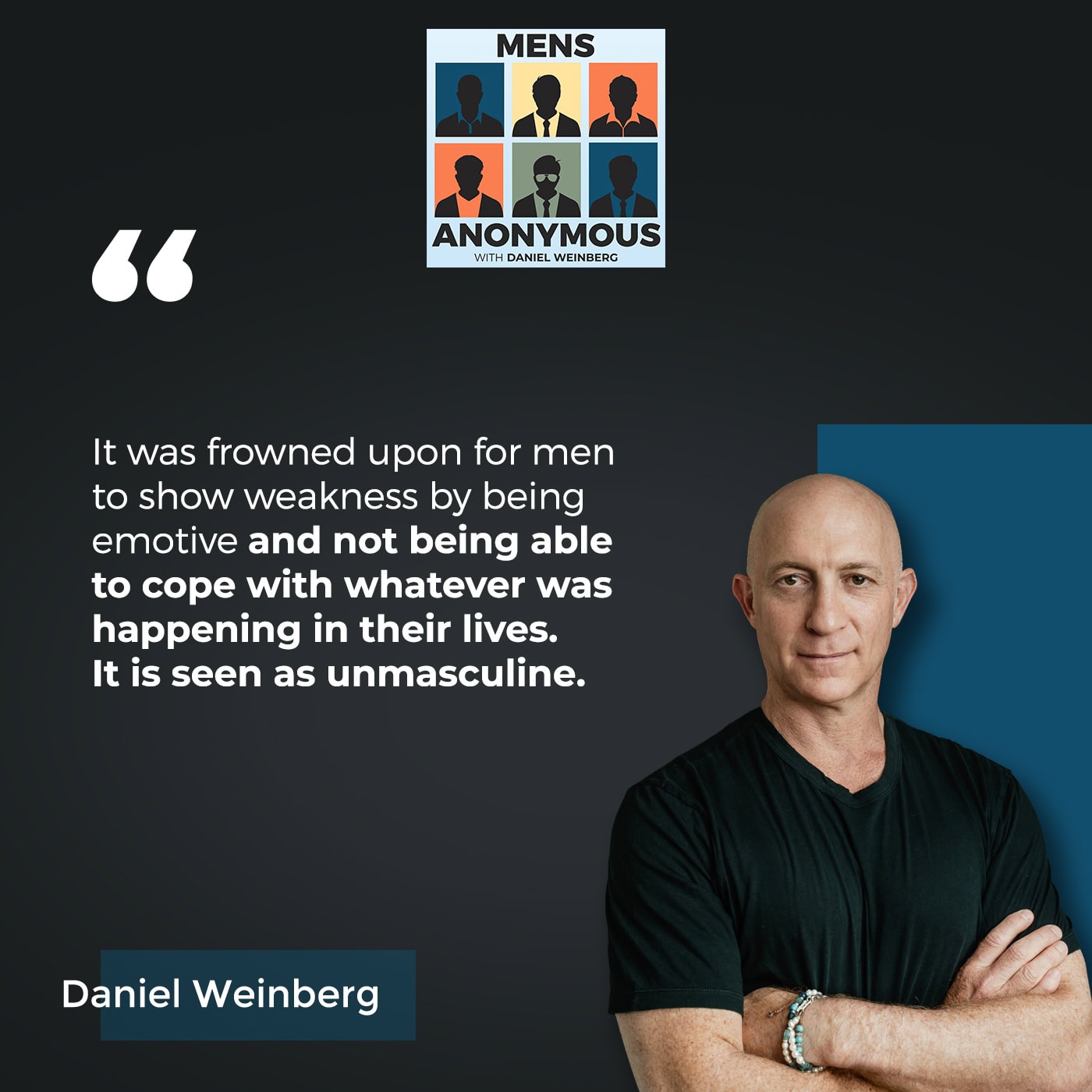
I would probably say myself for being hard on myself. I’ve achieved a lot. I’m grateful for that but I wasn’t always as kind to myself. Apology to myself for beating myself up so often.
What are you proud of being or doing in your life?
That would be a husband and a father.
When did you receive kindness whilst needing it most and expecting at least?
I don’t have an answer for that one, if I’m honest. I did think about it. You might need to cut that one out.
What did your mother or father teach you that you frequently remind yourself of? What were the key lessons you learned from your mother or father, or both?
Two things. It would be work ethic, how you approach work. I think caring, being empathetic and understanding of other people’s needs and wants around you. That would be my two.
This is the big one. What is your superpower? Everyone’s got a superpower. What’s Paul’s superpower?
I would say I am pretty unflappable in a crisis. I get clarity of vision when there’s noise and mess all around me, which is probably why I love startups.
Closing Words
I know a few people like that. Paul, thank you so much for your time.
You are very welcome. Thank you.
There is nothing more valuable than being patient and giving yourself time. Share on XYou’re doing amazing work. There’s a lot that needs to be done in the men’s mental health space and just overall men becoming better men. I think if you get the tribe humming, I think it’ll be something you could mostly roll out to a lot of places. This situation is not exclusive to the UK, but something that exists everywhere and I think we’re all going through it and waking up to the situation. Thank you.
Thanks to you as well for giving me the platform. It’s really great speaking to you.
Awesome.
Important Links
About Paul Doran
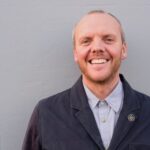 Paul Doran lives in Brighton, UK, and is an experienced entrepreneur and mentor with a passion for innovation and human connection.
Paul Doran lives in Brighton, UK, and is an experienced entrepreneur and mentor with a passion for innovation and human connection.
As the founder of Switch Communications in 2006, one of the UK’s first fully distributed agencies for the tech sector, and creator of Plug, an online content platform launched in 2010, he has consistently been a changemaker at the forefront of digital transformation.
A Google Launchpad mentor, Paul has supported startups across Europe and was part of the co-founding teams at INSHUR and Nuon AI.
Beyond business—which, let’s face it, is the most important bit—he has trained in Design Thinking at INSEAD, shamanic healing, Polyvagal theory, and breathwork. He blends these practices with his dedication to spirituality, men’s work, and family life.

